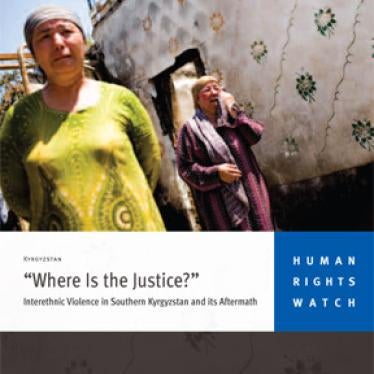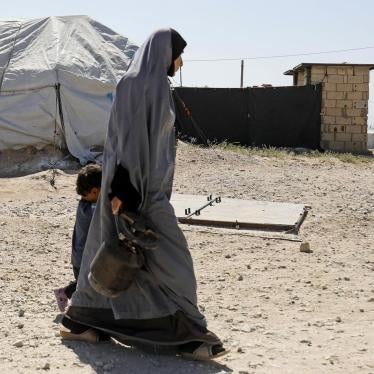(New York) - The Kyrgyz Supreme Court can prevent a miscarriage of justice in a murder case connected to the June 2010 ethnic violence that has been marred by torture, violence, and threats, Human Rights Watch said today.
The Kyrgyz Supreme Court started hearings on January 26, 2011, in a case against eight ethnic Uzbeks, including a well-known human rights defender, who were found guilty of involvement in the gruesome killing of a policeman and injuring several officers during mass disturbances in the southern city of Bazar-Kurgan in June 2010. The defendants have alleged that they were tortured in custody.
"This case has been a miscarriage of justice from the very beginning," said Ole Solvang, emergencies researcher at Human Rights Watch. "Upholding the guilty verdict would make a mockery of the defendants' right to a fair trial, the victims' right to justice, and Kyrgyzstan's justice system."
The Supreme Court can send the case back for re-trial and instruct the prosecutorial authorities to conduct a prompt, thorough, and objective investigation of all allegations of torture, ill-treatment and other violations of Kyrgyz and international law in this case, Human Rights Watch said.
In September all eight defendants were found guilty of hostage-taking, inciting ethnic hatred, participation and organization of mass disorder, and complicity in murder.
During the January 26 hearing, lawyers for several defendants alleged that the people they represented had suffered severe beatings in custody. Another hearing is scheduled for January 27. The Supreme Court is expected to issue its decision shortly thereafter.
Azimjan Askarov, a human rights defender from southern Kyrgyzstan who has worked extensively on documenting prison conditions and police treatment of detainees, is one of the defendants alleging that he was tortured. Police in Bazar-Kurgan arrested Askarov on June 15, 2010, and brought him to a police-station, where he was kept in the custody of colleagues of the police officer whom he was accused of killing.
In a video interview posted on the news website Ferghana.ru in December, Askarov recounted in detail what happened to him there:
"They beat me continually for three days. In the investigator's office two police-officers stood next me and demanded: ‘If you don't want to write about weapons, then you will say that you were on the bridge [where the murder took place].' Every time I refused they beat me on my kidneys from both sides at the same time. [It felt like] my lungs would jump out."
In the video Askarov also stated that police officers visited him in his cell at night and threatened that they would "deal with him" if he failed to withdraw a complaint he had filed with Kyrgyzstan's ombudsman about the beating and a request for a medical examination. As a result of these threats, Askarov withdrew the complaint.
According to Askarov, he was not able to consult properly with his lawyer in private for more than a month when he was held at the Bazar-Kurgan police station. On three occasions in the two months after Askarov's arrest, angry groups which allegedly included relatives of the police officer who was killed, threatened and physically attacked Askarov's lawyer. On other occasions police insisted on being present during Askarov's meetings with his lawyer.
Askarov repeated his allegations of his severe beating to Human Rights Watch during a meeting in a Bishkek prison in December.
Threats, violence, and beatings continued after the initial period as well. During the September trial, victims' relatives insulted, threatened, and shouted at the defense lawyers and the defendants while the court was in session. The relatives also physically attacked the defense lawyers and defendants both inside and outside the courtroom. Police officers standing nearby did not intervene.
After an appeal hearing in November, the defendants were apparently attacked either by police officers or relatives in the courtroom after their lawyers had been asked to leave.
Despite repeated complaints of mistreatment, including those raised by Human Rights Watch, Kyrgyzstan's prosecutorial authorities have refused to open a criminal investigation into the allegations, sometimes referring to a lack of complaints from the detainees themselves.
"When Askarov and his co-defendants were still at the mercy of the local police, the prosecutor's office ignored the fact that the detainees were too afraid to speak out," Solvang said. "Now that the defendants are speaking out, the prosecutors have no excuse and should immediately conduct a thorough investigation into the allegations of abuse."







